5 Easy Fruit Trees You Can Plant in Your Backyard
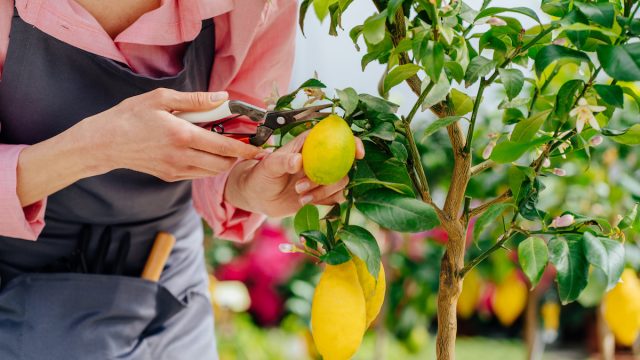
Planting fruit trees for the first time can be an intimidating prospect for novice gardeners. After all, virtually all plants require a certain amount of care—especially when they’re first taking root. In particular, experts say it pays to choose your trees wisely based on hardiness zones and average temperatures.
“Remember, it’s crucial to consider the specific climate, soil conditions, and sunlight availability in your area before choosing fruit trees for your backyard,” says Zahid Adnan, founder of The Plant Bible. “Additionally, regular monitoring for pests, diseases, and providing appropriate care like mulching, fertilizing, and watering as needed will help ensure healthy and fruitful trees.”
However, there are several types of fruit trees that tend to be the easiest to care for, making them ideal for people who are just getting started at developing their green thumb. Read on to learn about five easy fruit trees to plant in your backyard, according to gardening experts.
READ THIS NEXT: 8 Easy Outdoor Plants That Don’t Need Sunlight.
5 Easy Fruit Trees You Can Plant in Your Backyard
1. Apple trees
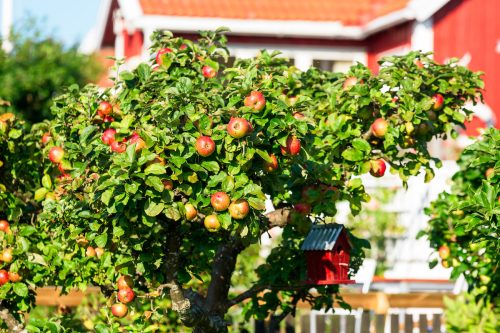
Beginner gardeners interested in planting fruit trees can see great success with apple trees thanks to their adaptability and low maintenance needs. And with many varieties to choose from, you’re sure to find one that will thrive under your garden’s conditions.
“They are available in various sizes, including dwarf and semi-dwarf varieties, making them suitable for smaller spaces,” notes Gene Caballero, a landscaper and co-founder of GreenPal.
To ensure that your apple trees grow healthily and bear fruit, you’ll need to plant them in adequate sunlight and prune them regularly. You’ll also need to plant them alongside other varieties of apple trees, which enables bees to pollinate them.
However, once they are established, apple trees tend to be resilient. “Apples are known for their hardiness and can tolerate a range of soil conditions,” says Caballero.
2. Citrus trees
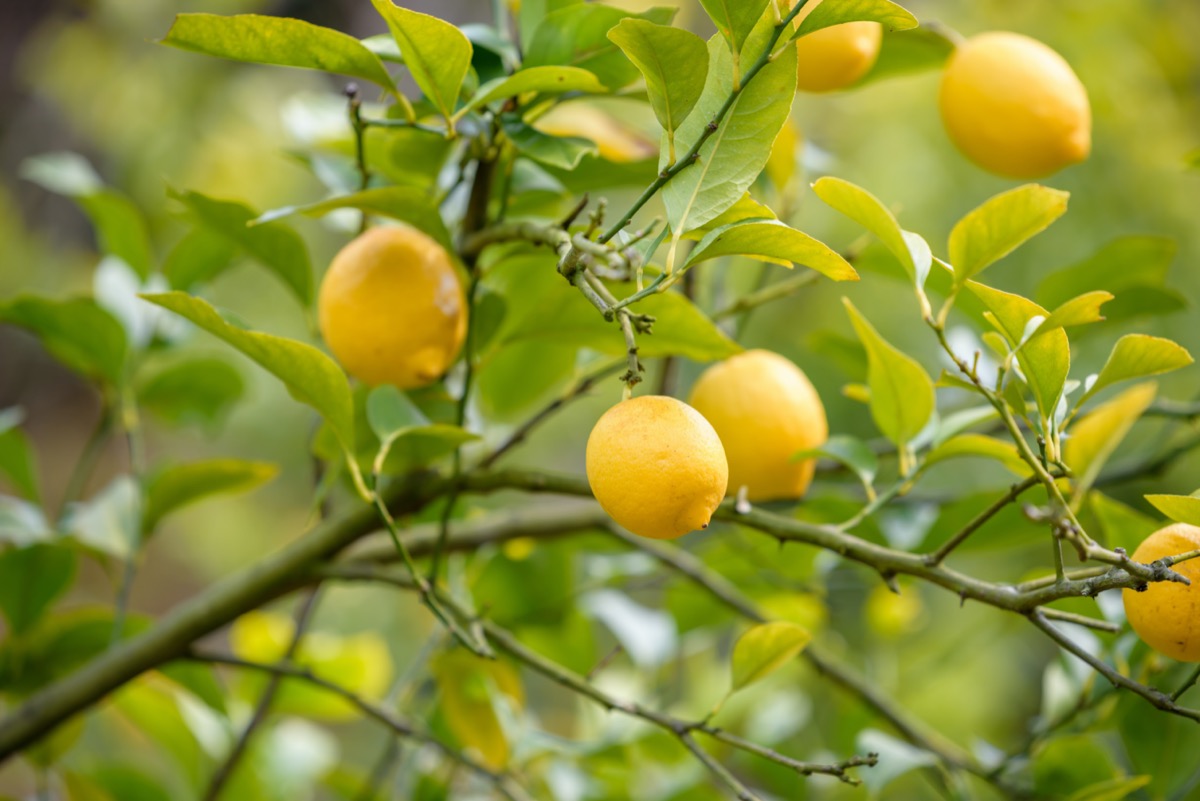
Depending on the climate in your area, citrus trees can be another hassle-free addition to your backyard.
“These are perfect in warmer climates as they require a minimum of six hours of sunlight per day,” says Scott Carroll, a gardening expert and blogger with Yard Work. “During winter, I recommend trying to grow them in containers indoors. This will give you a good head start as spring rolls around.”
Though citrus trees are low-maintenance, they do still need some monitoring and upkeep. “Citrus trees benefit from regular watering, particularly during dry periods, and occasional fertilization,” says Caballero. “Pruning is minimal, mainly focused on removing dead or damaged branches. With proper care, citrus trees can yield an abundance of delicious fruit.”
READ THIS NEXT: 5 Plants That Will Keep Mosquitoes Out of Your Yard, According to Pest Experts.
3. Peach trees
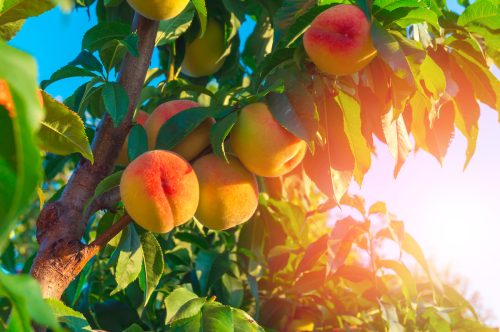
Peach trees prefer full sun, well-draining soil, and regular watering—especially during dry spells and when fruits are developing.
“Pruning is necessary to maintain the tree’s shape, remove diseased or dead branches, and promote airflow,” says Caballero. However, if you’re aware of their basic needs, peach trees tend to be hardy and adaptable.
“Peach trees are well-suited for backyard cultivation, thanks to their compact size and attractive blossoms,” adds Caballero. “With proper care, peach trees can reward you with juicy, flavorful fruits.”
4. Fig trees
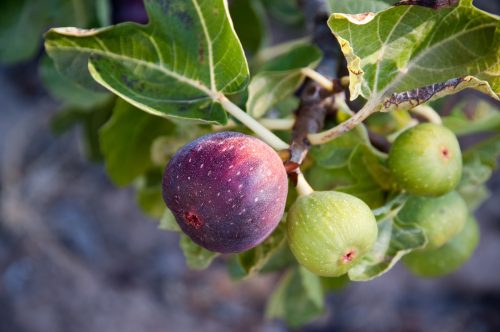
Able to thrive in a range of climates and soil types, fig trees are another easy fruit tree to plant in your backyard.
“Fig trees require minimal pruning, usually limited to removing dead or damaged branches. They prefer well-draining soil and regular watering during the growing season. Figs are a delightful fruit that can be enjoyed fresh or used in various culinary creations,” says Caballero.
However, Adnan notes that if you live in a particularly cold climate, you may need to take extra steps to protect fig trees from harsh winter weather. Try wrapping your fig tree in burlap and shredded leaves during late autumn or early winter to ensure that it bounces back in the spring.
For more gardening tips sent directly to your inbox, sign up for our daily newsletter.
5. Cherry trees
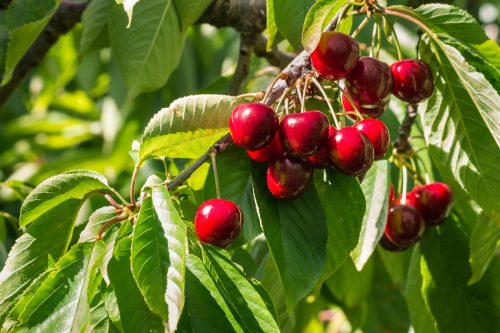
Cherry trees are a beautiful addition to any backyard, and they produce delicious fruit—just be sure to select the type carefully. If you prefer to eat fresh cherries off the tree, you’ll need to opt for sweet cherries. However, if you plan to cook and preserve them or bake with them, sour cherries may suffice.
“While sweet cherries require a more extensive growing space, sour cherry trees are more compact and suitable for smaller yards,” explains Caballero.
In order to successfully plant cherry trees, you’ll need well-draining soil and a sunny location, he notes. As with other fruit trees, you’ll need to water your cherry trees regularly during the first weeks after planting, beginning with every other day and gradually tapering off your watering schedule to once per week.
However, once they’re fully established, cherry trees rarely need to be watered and can rely on rain to meet their needs, adjusting for drought.